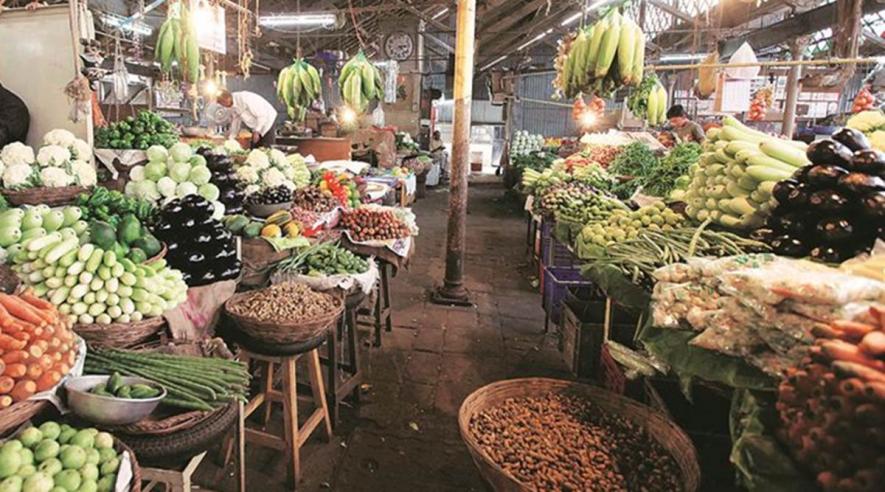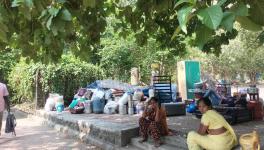COVID-19 in Rural India- XVII: Produce Sold at Lower Rates, Groceries’ Price Soar in Maharashtra’s Takviki

Representational image. | Image Courtesy: Indian Express
This is the 17th report in a series that provides glimpses into the impact of COVID-19-related policies on life in rural India. The series, commissioned by the Society for Social and Economic Research, comprises reports by various scholars who have been conducting village studies in different parts of India. The reports have been prepared on the basis of telephonic interviews with key informants in their study villages. This report talks about the difficulties Takviki village of Maharashtra’s Osmanabad district is witnessing amid the lockdown.
The COVID-19 pandemic and the government’s responses to it are having a severe impact on the villages of Marathwada. This report focuses on the situation in Takviki village, in the district of Osmanabad in Maharashtra.
The rabi season is ongoing across the region and harvesting operations need to begin now. Farmers had been concerned about the possibility of not getting adequate labour for the harvesting of wheat. However, around mid-March, a couple of days before the lockdown began, many daily wage workers who had migrated to big cities began to return and harvesting was completed.
At present, farmers are finding it difficult to source agricultural inputs like fertilisers and pesticides. In its lockdown announcement, the state government had categorised agricultural inputs as essential commodities, thus allowing agri-input shops to remain open. However, most of these shops continue to be closed; as a result, some farmers reported having to buy agri-inputs at higher prices.
At the same time, owing to the lack of access to the markets, farmers have been forced to accept low prices for their produce. A small farmer had planted one acre of eggplants and half an acre of beans. The beans have already been harvested and the eggplants will be harvested this week. Due to the absence of any means of transport, this farmer has not been able to take his produce to a major market and has had to sell his produce to the local agent at lower prices. He sold beans at Rs 20 per kg, whereas the retail price of beans in, say, Pune is Rs 60-70 per kg. It is interesting to note that while farmers are not able to get fair prices for their produce, consumers in cities are paying significantly higher prices for the same. For example, a 20 kg box of tomatoes is being sold at Rs 50, while consumers in Pune are paying Rs 60 per kg. Even those farmers who can afford to somehow transport their produce to bigger markets are facing a problem because most APMC [Agricultural Produce Market Committee] markets and mandis have suspended auctions.
Many villages are suspending all social and economic activities, either because they have been ordered to do so by the administration, or sometimes even spontaneously. This means that there is no scope for non-agricultural employment in Takviki. The major sources of non-agricultural employment in the vicinity are primarily construction, brick-kilns, or small industries, among others. All these sectors have suspended operations, leaving daily wage workers jobless. As is the case with Maharashtra in general, there is no MGNREGA work available in Takviki village.
There are no bank branches or ATMs in the village. Cash transactions are not taking place at this time. There are reports of the police beating people up if they venture out of their houses, and so most people are reluctant to visit banks or ATMs. For agricultural work, farmers as well as agricultural labourers prefer to pay and receive wages in kind. This is because the farmers are facing a huge liquidity crisis.
For the poorer sections of the population, the lack of work and cash is compounded by the fact that village-level grocery shops are selling essential food and non-food items at a premium. Grocery shop owners have reported that if the lockdown continues for more than 15 days, their stocks will be exhausted and they will not be able to replenish them.
The implementation of the lockdown is being undertaken by villagers themselves. All entry points into the village have been closed and no strangers are being allowed in. Anyone returning to the village is instructed to remain in home quarantine. Instances of physical violence have been reported from a number of villages in the region, mostly involving migrants from Pune and Mumbai seeking to return to their homes. After the incendiary coverage of the Nizamuddin Markaz in many sections of the media, villagers have been targeting Muslims and the overall peace of the villages has been disturbed.
The author is a senior agricultural economist with PEAT.
Also read: COVID-19 in Rural India- XV: Agricultural Markets in Disarray
Get the latest reports & analysis with people's perspective on Protests, movements & deep analytical videos, discussions of the current affairs in your Telegram app. Subscribe to NewsClick's Telegram channel & get Real-Time updates on stories, as they get published on our website.
























